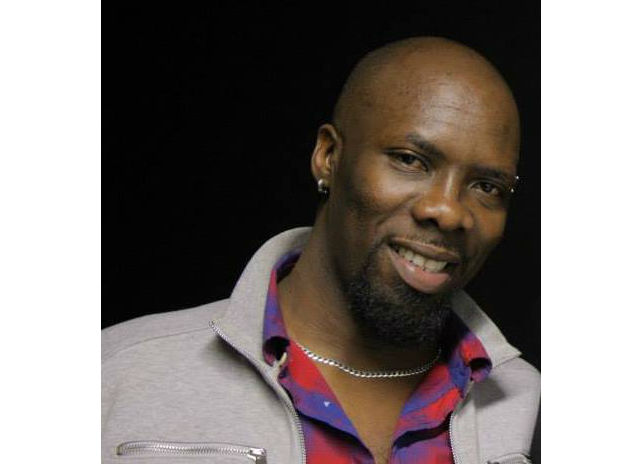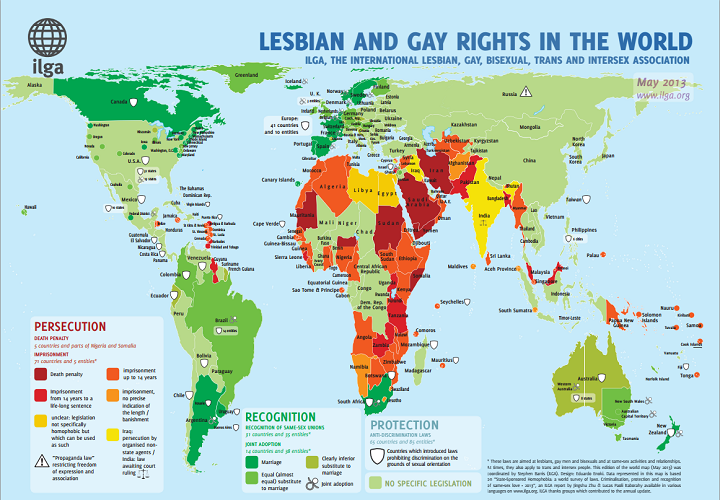WorldPride celebrations are well underway in Toronto this week, putting a global focus on the rights and security of lesbian, gay, bisexual and transgender (LGBT) people.

There are 77 countries where homosexual acts are criminalized and punishable by lengthy prison sentences or even death, forcing many LGBT individuals to flee to other countries out of fear of persecution.
When the WorldPride parade works its way through Toronto streets on Sunday, one of the people leading the way will be Gareth Henry — an LGBT rights activist and refugee. He will be one of six returning international marshals.
READ MORE: LGBTQ couples tie the knot in Toronto mass wedding
Henry felt his life was in “imminent danger” when he finally decided to flee his home in Jamaica and come to Canada as a refugee.
Men he believed to be police officers stopped him in traffic, as he headed to the office of the gay rights organization he worked for, he said, and told him someone wanted to kill him.
That was in November 2007, when he had already been living in hiding following years of threats and having previously been beaten up by police officers, he told Global News.
“I was forced to accept that I was going to be killed at some point in time and I was forced to deal with the reality of choosing life over death,” said Henry, who was an LGBT rights activist with the Kingston-based Jamaica Forum of Lesbians, All-Sexuals and Gays (J-FLAG).

“It was a very tough decision to make, in terms of leaving home, leaving family, leaving a job I love, leaving my community and going to a foreign place where I would have to start my life over.”
READ MORE: Gay hate crimes more likely violent: Statcan
Jamaica may be a paradise for sun seekers, but it can be hell for LGBT individuals, even though President Portia Simpson-Miller showed support for the LGBT community in the lead-up to her election in 2012, and vowed improve the situation by reviewing the country’s colonial-era sodomy (or buggery) laws.

Get breaking National news
A 2012 survey, co-sponsored by J-FLAG, of attitudes towards homosexuality in Jamaica, found almost 77 per cent of respondents were against changing the buggery laws, while 65 per cent did not believe Jamaica’s Charter of Fundamental Rights and Freedoms should be amended to protect LGBT individuals.
The survey also found 53 per cent of respondents believed gays could change their sexual orientation with professional help and more than 83 per cent believed homosexuality and bisexuality were immoral.
J-FLAG also found that between 2009 and 2012, there were 231 reported incidents of discrimination and violence against LGBT people — including physical attacks, being forced to leave homes or communities, corrective rape (attempting to make someone heterosexual through sexual assault) or murder.
To view a larger version of this map click here
Henry became the head of J-FLAG in 2004, after the organization’s previous leader, Brian Williamson, was murdered. Henry told the Guardian in 2012 that 13 of his friends in the LGBT community were murdered between the time he took over as co-chair of J-FLAG and when he came to Canada as a refugee in 2008.
He chose Canada because of the “freedoms, rights and privileges” provided to LGBT individuals.
Henry had his refugee claim expedited because of his prominence as human rights activist and with the assistance of organizations such as the Metropolitan Community Church of Toronto, Amnesty International and EGALE Canada. He arrived in Jan. 2008 and was granted refugee status in June of that year.
Although he was in a place where he felt safe, he said the anti-gay harassment didn’t stop once he moved to Toronto: his family continued to experience discrimination after his story garnered international media attention.
His mother and his sister, along with her two children, have since come to Canada as refugees out of fear for their own safety.
Finding safe haven for LGBT refugees
Henry is grateful for being in a place where he can feel comfortable being himself and continues to supports LGBT people facing persecution because of their orientation, through his work with Toronto-based Rainbow Railroad.
That organization was born out of the experience of activists attending WorldPride 2006 in Jerusalem, meeting with LGBT Palestinian refugees who had fled their communities but were stuck in Israel with no place to go because they “were seen primarily as security threats there,” explained Michael Battista, a lawyer who is the chair of Rainbow Railroad.
As the name suggests, the name of the organization was inspired by the underground railroad that helped slaves escape the United States to Canada in the 19th century.
READ MORE: Should gays be worried about Uganda’s Kutesa as UNGA president?
“LGBT refugees are kind of unique from other refugees because usually at the point they have to leave they’ve already been thrown out of the families and communities,” Battista explained. “So, they really don’t have the resources to fund the journey out of the country and that’s what we’ve been very effective at doing.”
Battista explained Canada recognizes claims of LGBT refugees because most are “fleeing from well-documented homophobic violence or laws that criminalize homosexuality.”
While Rainbow Railroad is relatively new, the organization has a growing network worldwide, including in places where the situations for LGBT people have worsened in recent years, such as in Uganda, Nigeria and Russia.
But there are also countries on the list that are even closer to home.
“There are countries right on Canada’s doorstep that we think of as vacation paradises that are very homophobic societies, places like St. Kitts, Trinidad and Jamaica that actually have laws that criminalize homosexuality,” Battista said.
Awareness about those situations has increased and governments such as Canada’s, in particular Foreign Minister John Baird, have been increasingly vocal in their opposition to laws that oppress LGBT communities.









Comments